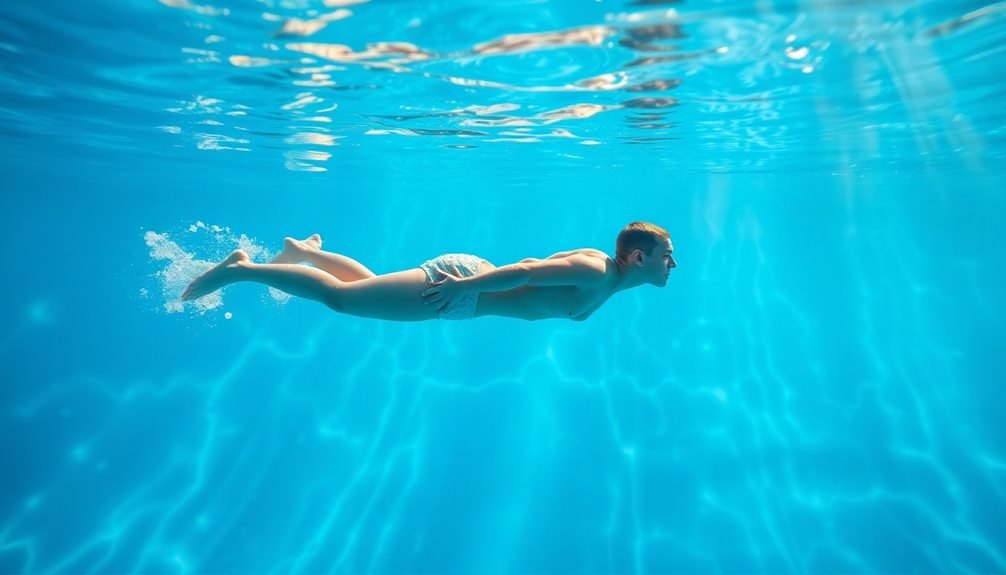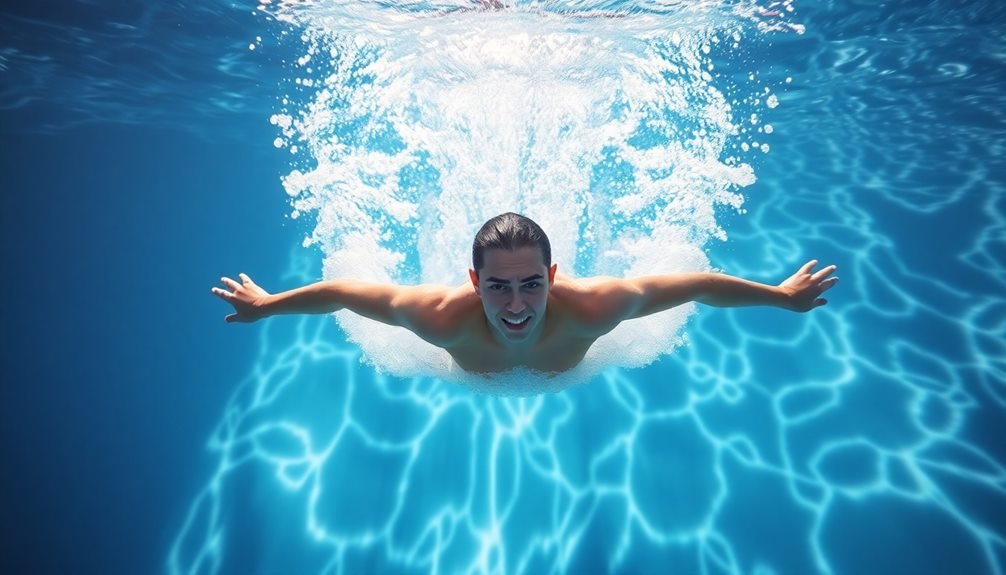Swimming isn't just great exercise – it's a powerful mental health booster that can transform your well-being. When you enter the water, hydrostatic pressure stimulates your parasympathetic nervous system, naturally lowering anxiety and stress levels. Your body releases endorphins while the rhythmic motions of swimming create a meditation-like state, clearing your mind and dissolving tension. The water's buoyancy helps decompress your joints while increasing blood flow to your brain by 14%, enhancing oxygen delivery and promoting emotional regulation. Whether you're a beginner or seasoned swimmer, the pool's tranquil environment holds the key to accessing deeper mental clarity and peace.
The Science Behind Water Therapy

From ancient healing rituals to modern therapeutic practices, water therapy's scientific benefits are well-documented. When you're immersed in water, your body releases endorphins and reduces cortisol levels, creating a natural antidepressant effect.
The water's hydrostatic pressure stimulates your parasympathetic nervous system, triggering your body's relaxation response and lowering anxiety.
You'll experience immediate neurological benefits as water therapy activates multiple sensory pathways. The consistent rhythm of swimming strokes increases the production of brain-derived neurotrophic factor (BDNF), which enhances cognitive function and memory.
The water's temperature and pressure also stimulate your vagus nerve, improving emotional regulation and stress resilience.
Research shows that aquatic exercise increases blood flow to your brain by 14%, enhancing oxygen delivery and promoting the growth of new neural connections.
The weightlessness you feel in water reduces physical tension, which directly impacts your mental state.
Water's unique properties create a therapeutic environment that combines physical exercise with sensory integration, making it an effective treatment for conditions like PTSD, depression, and chronic stress disorders.
The measurable changes in brain chemistry explain why you'll often feel mentally refreshed after a swim.
Swimming Away Stress
When you're stressed, swimming offers a natural escape as your body's physical tension dissolves in the water's gentle embrace.
You'll notice your mind becoming clearer as the repetitive motions and steady breathing create a meditation-like state that washes away anxious thoughts.
The combination of rhythmic movement and water's buoyancy makes swimming one of the most effective natural remedies for stress relief and anxiety management.
Physical Tension Melts Away
Nearly every swimmer has experienced the unique sensation of physical tension dissolving in the water. As you glide through the pool, you'll notice your muscles gradually releasing their grip on stored stress. Your body's natural buoyancy helps decompress your joints and spine, while the water's gentle pressure acts like a full-body massage.
| Body Area | Tension Relief | Swimming Benefit |
|---|---|---|
| Neck & Shoulders | Releases upper body strain | Freestyle stroke lengthens muscles |
| Back | Decompresses spine | Horizontal position reduces gravity's impact |
| Joints | Reduces pressure | Low-impact movement lubricates joints |
| Muscles | Relaxes tension knots | Water resistance provides gentle massage |
| Core | Eases abdominal tightness | Rotational movements improve flexibility |
The water's temperature also plays an essential role in releasing physical tension. Whether you're swimming in cool or warm water, your body responds by adjusting blood flow and muscle tone. You'll find that regular swimming sessions help maintain this relaxed state even after you've left the pool, as your body learns to carry less tension throughout your daily activities.
Mind Calms in Water
The physical release of tension in swimming naturally extends to mental relief. As you glide through the water, your mind enters a meditative state, creating a unique form of moving meditation. The rhythmic patterns of breathing and stroking help quiet racing thoughts and reduce anxiety.
When you're immersed in water, you'll notice how external distractions fade away. The pool's environment limits sensory input, allowing your brain to focus solely on your movement and breath. This sensory reduction triggers your body's relaxation response, lowering stress hormones like cortisol and adrenaline.
You'll find that swimming creates a natural mindfulness practice. The repetitive motions and the water's gentle pressure help you stay present in the moment, making it difficult to worry about work deadlines or personal concerns.
The buoyancy of water also reduces the effects of gravity on your body, which can help release mental tension you're holding.
Regular swimming sessions can improve your sleep quality and boost your mood through the release of endorphins. You'll likely notice that post-swim clarity stays with you throughout your day, helping you maintain emotional balance and mental sharpness.
Natural Anxiety Relief Method
Swimming offers numerous anxiety-relieving benefits that make it a powerful natural treatment for stress. When you're feeling overwhelmed, diving into the pool can trigger your body's relaxation response, reducing cortisol levels and increasing endorphin production. The rhythmic nature of swimming strokes creates a meditative state that helps quiet anxious thoughts.
| Anxiety Symptom | Swimming's Solution |
|---|---|
| Racing thoughts | Focused breathing techniques while swimming laps |
| Muscle tension | Water's buoyancy releases physical strain |
| Excess energy | Cardiovascular workout burns stress hormones |
You'll find that swimming's combination of physical exercise and gentle resistance provides a natural way to manage anxiety. The water's pressure against your skin stimulates nerve endings, promoting the release of feel-good chemicals in your brain. Plus, you don't need special equipment or training to start experiencing these benefits – just basic swimming skills and access to a pool. Regular swimming sessions can help you develop a sustainable anxiety management routine that doesn't rely on medication. Whether you choose to swim laps or simply float, you're engaging in a proven method for reducing stress and improving your mental well-being.
Building Mental Resilience Through Swimming

Swimming builds resilience by teaching you to push through physical and mental barriers, much like overcoming life's challenges.
You'll find that each stroke becomes a moving meditation, helping you process difficulties while staying focused on the present moment.
When you face obstacles outside the pool, you'll draw upon this practiced resilience, remembering how you've conquered lap after lap, wave after wave.
Swim Through Life's Challenges
Through consistent practice in the water, you'll develop more than just physical strength – you'll build lasting mental resilience. Each lap you complete trains your mind to push through discomfort, teaching you that temporary challenges won't break you. When you're tired but continue swimming, you're reinforcing the belief that you can overcome obstacles.
Swimming's repetitive nature creates a unique opportunity to practice mindfulness and emotional regulation. As you navigate the water's resistance, you'll learn to regulate your breathing, calm your thoughts, and maintain focus under pressure. These skills translate directly to managing life's daily stresses and unexpected setbacks.
You'll discover that the discipline required in swimming – showing up for practice, setting goals, and working through plateaus – builds a framework for tackling personal and professional challenges.
The water becomes your training ground for developing patience, persistence, and problem-solving abilities. When you face a difficult project at work or a personal setback, you'll draw upon the same mental toughness that helps you complete that challenging workout.
The resilience you build in the pool becomes your anchor during life's storms.
Meditation in Motion
A gentle but powerful form of moving meditation awaits you in the pool. As you glide through the water, each stroke becomes a mindful moment, creating a rhythmic pattern that calms your thoughts and centers your awareness.
The repetitive nature of swimming naturally guides you into a meditative state, where you'll find yourself focusing solely on your breath, movement, and the sensation of water against your skin.
You'll discover that swimming offers a unique form of moving meditation that's different from traditional seated practices. The water's buoyancy helps release physical tension, while the steady cadence of your strokes creates a natural breathing pattern.
This combination allows you to enter a flow state where external stressors fade away, and you're fully present in the moment.
With each lap, you're practicing mindfulness without trying. The pool becomes your sanctuary, where the usual mental chatter subsides, replaced by the peaceful rhythm of your movement through water.
This moving meditation strengthens both your body and mind, teaching you to maintain focus and find tranquility even when facing life's turbulent waters.
Water Meditation Techniques
In recent years, water meditation has emerged as a powerful method for achieving mental clarity and inner peace while swimming. You'll find that combining mindfulness practices with your swim routine can transform a regular workout into a deeply therapeutic experience.
To practice water meditation effectively, you'll need to focus on specific techniques that work best in the aquatic environment. Start by becoming aware of your breath, synchronizing it with your strokes, and letting your thoughts float away with each exhale.
| Technique | Benefit |
|---|---|
| Bubble Meditation | Focus on creating and watching bubbles as you exhale underwater |
| Float Focus | Let the water support you while practicing body awareness |
| Stroke Counting | Count strokes to maintain presence and rhythm |
| Sound Immersion | Listen to the underwater sounds to ground yourself |
| Movement Flow | Pay attention to how water flows around your body |
Remember to start with shorter sessions and gradually increase duration as you become more comfortable. You'll notice that these techniques become more natural with practice, helping you develop a deeper connection between your mind, body, and the water around you.
Social Benefits at the Pool

Swimming's social atmosphere creates natural opportunities for connection and community building. Whether you're taking a water aerobics class or sharing a lap lane, you'll find yourself naturally interacting with fellow swimmers who share your interest in aquatic fitness.
You'll discover that pools often serve as community hubs where you can meet people across different age groups and backgrounds. The casual environment makes it easy to strike up conversations between laps or while cooling down.
Many pools offer group activities like swim teams, aqua fitness classes, or masters swimming programs that can help you build lasting friendships with regular participants.
If you're looking to expand your social circle, you'll find that pool regulars often organize informal gatherings, from morning coffee meet-ups to weekend swim sessions. Parents watching their children's swim lessons frequently form support networks, while lap swimmers often develop camaraderie through shared lane etiquette and mutual respect.
The pool's social environment can be especially beneficial if you're new to an area or seeking to combat isolation, as the shared experience of swimming naturally brings people together in a low-pressure, wellness-focused setting.
Getting Started With Aquatic Wellness
Beyond the social connections at the pool, you'll want to begin your aquatic journey thoughtfully to maximize both physical and mental benefits. Start by choosing the right time of day when the pool isn't overcrowded, allowing you to focus on your mental wellness without distractions. Consider early mornings or late evenings when the atmosphere tends to be calmer.
Begin with gentle water exercises and basic strokes you're comfortable with. You don't need to swim laps immediately; instead, try water walking or floating to become familiar with the water's therapeutic properties.
As you progress, incorporate mindfulness techniques like focusing on your breathing patterns or the sensation of water against your skin.
Set realistic goals that align with both your physical capabilities and mental health objectives. If you're new to swimming, schedule two 30-minute sessions per week, gradually increasing duration and frequency.
Consider working with a qualified instructor who understands the mental health aspects of aquatic exercise. They can help you develop proper techniques while maintaining a stress-free environment.
Remember to track your mood before and after each session to identify patterns and adjust your routine accordingly.
Frequently Asked Questions
How Long Should I Swim to Experience Mental Health Benefits?
You'll gain mental health benefits from swimming just 20-30 minutes, three times a week. You can start feeling calmer and less stressed even after a single session. It's important to pace yourself comfortably.
Can Swimming Help With Specific Mental Health Conditions Like PTSD?
Yes, swimming can help manage your PTSD symptoms. You'll benefit from the rhythmic movements, controlled breathing, and water's calming effects. It's shown to reduce anxiety, flashbacks, and stress levels when practiced regularly.
Is Indoor or Outdoor Swimming Better for Mental Wellness?
Both indoor and outdoor swimming can boost your mental wellness, but outdoor swimming offers extra benefits of nature exposure and vitamin D. You'll find peace in either setting – choose what's most comfortable for you.
What's the Best Time of Day to Swim for Maximum Psychological Benefits?
You'll get the best mental boost by swimming early morning, between 6-8 AM. It'll energize your day, reduce anxiety, and improve mood. Evening swims (7-8 PM) can help you unwind and sleep better.
Does Water Temperature Affect the Mental Health Benefits of Swimming?
You'll get ideal mental benefits in water between 77-82°F (25-28°C). It's warm enough to relax your muscles without stress, but cool enough to keep you alert and energized during your swim session.
In Summary
You'll discover that swimming offers more than just physical fitness – it's a gateway to mental clarity and emotional balance. Whether you're gliding through lap lanes or practicing water meditation, you're tapping into a powerful stress-relief tool that's been proven effective for generations. Don't wait to plunge into these benefits; start your aquatic wellness journey and watch your mental health transform with each stroke.





Leave a Reply